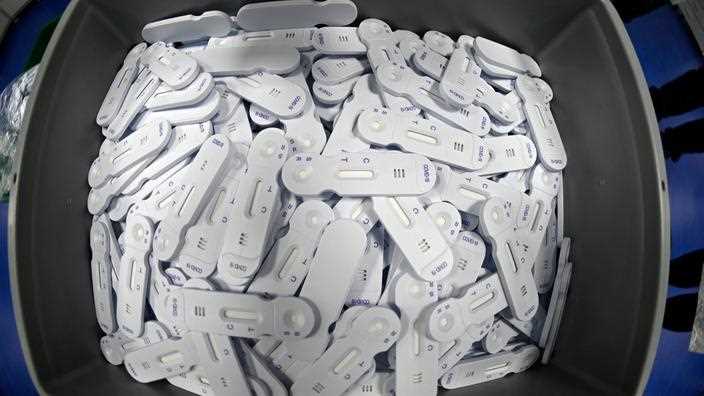Since February 15, supermarkets are no longer allowed to sell them. Most of them still have substantial stocks.
The supermarkets have therefore surrendered. The authorization allowing them to sell self-tests ended on Tuesday, after a month and a half of activity on an exceptional basis to meet the strong demand from the French. The operation was a great success with no less than 17 million self-tests sold between December 28 and January 16 according to the panelist NielsenIQ, for a turnover of 25 billion euros over the same period. But since Tuesday, the heart is no longer at the party. Unsold items are piling up in warehouses and no sign has yet any horizon on the possibility of selling at least the remaining stocks.
3 weeks of remaining stock
The Fédération du commerce et de la distribution (FCD) estimates that there would be an average of 3 weeks of stocks left to sell for supermarkets, which amounts to “few millions» number of self-tests in total. It is also said “surprise)of the government’s decision to lift this authorization, which originally hinted at an extension beyond February 15. “We have been asking them for 15 days what we are doing with stocks, but no written response has reached us. The vagueness is maintained and the logistical constraints are not taken into account“adds the FCD. At Systèmes U, we put things into perspective. There are certainly unsold items, but the group suspected that this authorization would only be temporary: “We were careful with the orders“, explains Thierry Desouches, director of external relations. Same situation at Carrefour wherevery little» stocks remain.
Read alsoThe sale of self-tests in supermarkets is over
The question of the future of these self-tests nevertheless deserves to be asked in order to avoid any waste. But apart from theresell to the state“, as the general delegate of the FCD, Jacques Creyssel, jokes, few solutions are available to brands. The medical aspect is to be taken into account «on can not distribute them as gimmicks, the product must be respected“, emphasizes Thierry Desouches. And the expiry date can cause the device to lose quality, so time is running out. The hypothesis of a sale at discounted prices to pharmacies seems difficult to envisage, given the recent tensions.
The sale of self-tests in supermarkets had indeed been the subject of tough negotiations with pharmacists, who deplored the disappearance of their role as advisers in this system and who campaigned to keep the monopoly on sales. Then the supply had been in question, some pharmacies suffering several stock shortages. Since Tuesday, they are therefore only available in pharmacies. A change that is accompanied by a slight drop in prices: it will now cost €3.35 for an adult and €4.10 for a child. Prices still higher than in supermarkets, which mostly carried out operations at cost price.
SEE ALSO – A single self-test, end of the mask outside: the new announcements by Jean-Michel Blanquer
